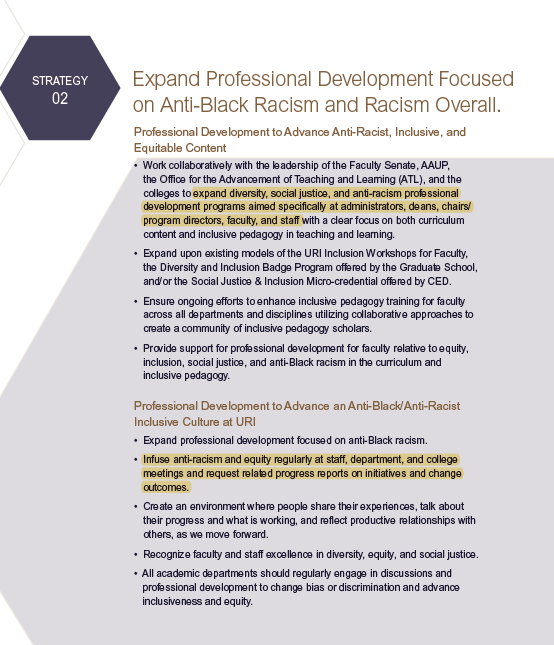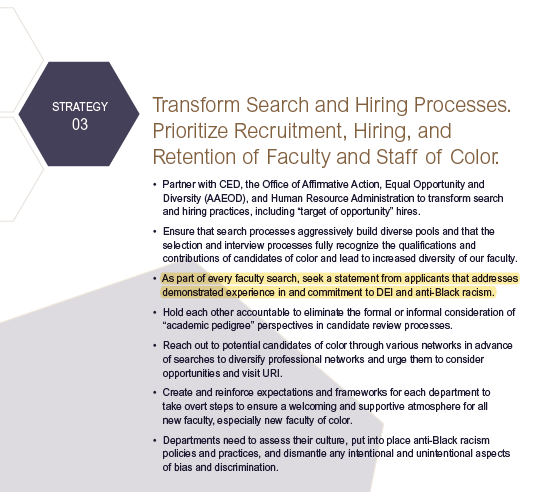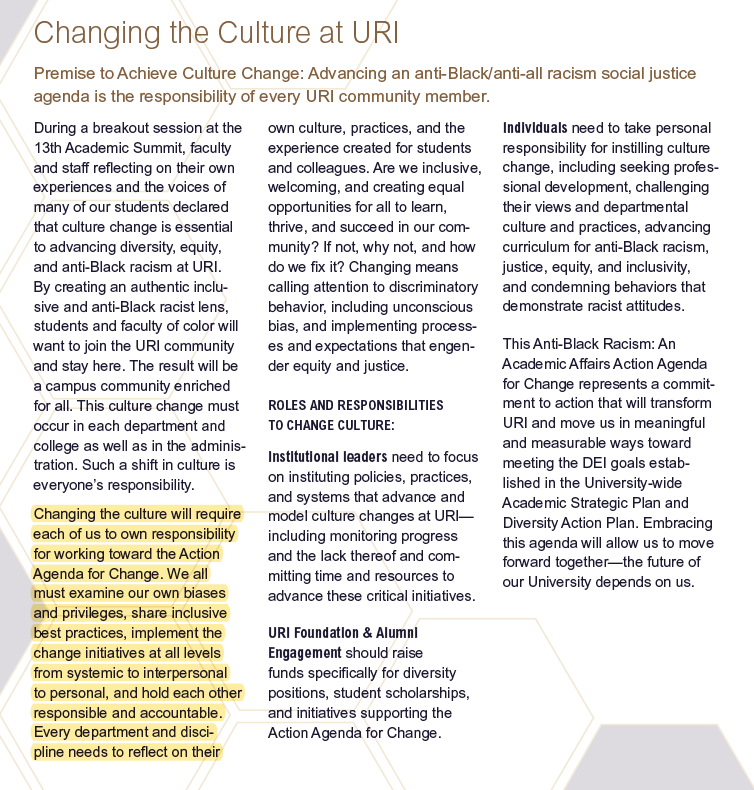The University of Rhode Island is infusing social justice across its curriculum
Let's walk through their "Academic Affairs Action for Change 2021
The University of Rhode Island is a public, land grant institution. That means that not only are they funded by the taxpayers for their operations, but they were also gifted the land they operate on by the government as part of the Morrill Act signed in 1862. The express purpose of the act was to provide the resources to educate the citizens that would form the backbone of the nation, at that time specifically tied to agriculture.
A century and a half later, URI deems social justice more essential to the national interest, as outlined in their Anti-Black Racism: An Academic Affairs Actions Agenda for Change, 2021.
In this article, I’ll explore some of the more interesting aspects of the plan. The full PDF is available in my Locals for review.
1) URI explicitly embraces intersectionality and equity.
Intersectionality is a term introduced by critical race theorist extraordinaire Kimberle Crenshaw in 1989 as a way of articulating multiple types of oppression. By specifically embracing “an intersectional approach”, URI is telling us that they are going to treat students differently based on immutable characteristics, such as race, gender, sexual orientation, etc.
Equity is the concept of equalizing outcomes. It is not to be confused with '“equality” which is about equalizing access to opportunity. When URI says they are addressing “inequities relating to all groups and community members whose rights and liberties may be at risk,” what they are suggesting is, again, that they will treat students differently based on immutable characteristics in an effort to reduce any disparity in outcomes, even if that disparity is related to individual effort rather than the existence of any systemic issue.
2) URI is planning for all students, regardless of major, to be indoctrinated into a curriculum pertaining to anti-racism, equity, and social justice.
The university is specifically planning to integrate requirements related to social justice as a part of the general education curriculum. Additionally, they are planning to integrate it into the curricula of colleges within the university system. That means that even if students are taking courses in the College of Engineering, the College of Health Sciences, or the College of Business, they will still be taught materials relating to social justice and equity.
3) URI is planning to integrate anti-racism, equity, and social justice into professional development for staff and administrators in addition to faculty.
This means that staff working at this public, taxpayer-funded institution will be forced to complete professional development training that encourages
Notice the words “inclusive pedagogy.” This is one of the ways in which they infuse social justice and equity through the curriculum, and focuses on teaching faculty members to use the correct language so that they can be a model for “inclusive language” for their students. That includes removing all gendered language, acknowledging the lived experiences of students as part of class instruction, and examining their own implicit bias.
4) URI is going to require statements related to diversity, equity and inclusion for every faculty member applying for a job at the state-run institution.
It is not legal to make hiring decisions based on elements that are not relevant to the core function of the job you are expecting people to do. For example, employers cannot use personality tests as decision-maker in the hiring process because the results of the test are not related to the core function of people’s jobs.
In implementing this part of their plan, URI is saying one of two things:
They are going to violate employment law by making hiring decisions based on elements that are not relevant to an applicant’s ability to do the job
Or, they consider equity to be a core function of a faculty members’ job.
It’s one or the other. And either way, it doesn’t speak well for the type of education students can expect to receive at this state-funded university.
5) URI is planning to use tuition dollars and state funds to fund diversity positions in each college.
The University of Rhodes Island has 9 different colleges within the university system. That means funding a minimum of 9 different coordinator positions in order to ensure these measures are integrated across campus. At $55,000 per position, this will likely cost the university at least half a million dollars in taxpayer funds and tuition. But, let’s be honest, it will probably cost significantly more than that.
Their goal is culture change.
The cultural revolution we are in as a society has been driven first and foremost by the universities…and they are so brazen in their efforts that they are doing it in place sight.
Expose the woke and support my work
I believe the woke are an existential threat to the values we hold most dear as Americans. Some of them know it, most of them are just useful idiots. Regardless, fighting back against this cultural revolution is my full-time job. I’m dedicated to exposing the woke ideology in our country, helping people to understand what’s going on, and providing spaces for unwoke people to connect, support each other, and plan ways to fight back.
Here’s how you can help.
Subscribe to my YouTube channel: https://www.youtube.com/drkarlynborysenko
Send me whistleblower documents: activelyunwoke@gmail.com
Join my Locals community and find like-minded people: https://kb.locals.com
Support my work: Become a monthly or annual member of my Locals, or make a one-time donation at https://kb.locals.com/support










The arts have been infested with this since the 90x